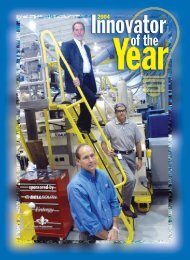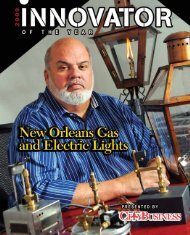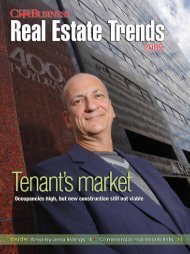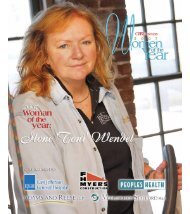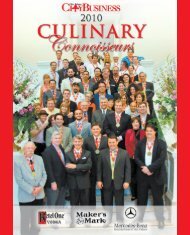INNOVATORS Gold Award - New Orleans City Business
INNOVATORS Gold Award - New Orleans City Business
INNOVATORS Gold Award - New Orleans City Business
- No tags were found...
Create successful ePaper yourself
Turn your PDF publications into a flip-book with our unique Google optimized e-Paper software.
ON THE BRINK<br />
Precast Building Solutions<br />
Key innovation: constructing specially engineered<br />
homes of premade concrete panels<br />
Where they’re based: <strong>New</strong> <strong>Orleans</strong><br />
Top executive: Brian Opert, CEO<br />
Year introduced: 2006<br />
SICKENED BY THE loss of more than 200,000 residential<br />
homes because of Hurricane Katrina, Brian Opert felt<br />
compelled to offer <strong>New</strong> Orleanians a better way to survive<br />
the next storm.<br />
“We are the only country in the world that still builds<br />
out of wood, and it’s simply not practical,” said Opert,<br />
who established Precast Building Solutions to construct<br />
specially engineered homes made of precast concrete<br />
panels.<br />
Built to exceed current international building code<br />
standards, PBS homes are hurricane-, tornado-, flood-,<br />
fire-, termite-, mold-, rot-, vermin- and even bulletproof,<br />
Opert said. The basic design of PBS homes is like a tornado-safe<br />
house in that the floors and ceilings, as well as<br />
the walls, are comprised of precast concrete panels able to<br />
withstand 500 mph winds.<br />
The home is completed with three-paned system impactresistant<br />
windows and a roof that is a sealed insulated panel<br />
system consisting of urethane foam sandwiched between<br />
two steel panels. All utilities, such as the hot water heater and<br />
air conditioning system, are between the roof and the ceiling<br />
so they won’t flood and can be easily accessed.<br />
Because it’s made of concrete, the home is more ecofriendly<br />
and energy efficient, Opert said.<br />
“Concrete doesn’t absorb and release energy as quickly<br />
as wood, so it’s like a wine cellar — cooler in the summer<br />
and warmer in the winter,” he said.<br />
Additionally, an average stick-built house would<br />
require sacrificing 28 or more trees, he said. <strong>New</strong> <strong>Orleans</strong><br />
city code requires the use of wood pilings for residential<br />
construction. However, Opert is working to gain acceptance<br />
for alternative foundation piling materials such as<br />
precast concrete or auger cast pilings, which are the norm<br />
in heavy construction.<br />
Since it won’t burn, the PBS home costs about half as<br />
much to insure than a stick-built structure and long-term<br />
maintenance is significantly more affordable.<br />
“It’s very quick to build,” Opert said. “It only takes a<br />
day and a half or two days to erect the panels, and we can<br />
deliver the whole house within six to eight weeks.”<br />
Even other concrete homes being built — poured in<br />
place, or concrete masonry units finished with stucco<br />
require a lot of labor to construct, Opert said.<br />
“We just need one welder, three helpers and a crane,<br />
and we’ve got the walls built.”<br />
Specially designed casting forms make the finished<br />
product look like wood. •<br />
— Angelle Bergeron<br />
PHOTO BY FRANK AYMAMI<br />
Precast Building Solutions’ Brian Opert started building homes made from premade concrete panels after seeing the destruction caused by Hurricane Katrina’s winds.<br />
<strong>New</strong> <strong>Orleans</strong> <strong>City</strong><strong>Business</strong> 59A




